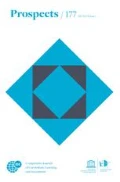Abstract
This article considers lessons learnt through involvement in several assessment projects. Early experience, in university work and in school examinations, led to an opportunity to help establish a novel system of assessment for an innovative school curriculum. Different lessons were then learnt from work on a national survey of school students’ learning of science, and different lessons again while leading a group to advise the UK government on a new scheme for national testing of all students. Many welcomed the group’s advice but politicians rejected it; however, the recoil from this defeat led to very rewarding work on formative assessment. The article ends with reflection on the conflict between the summative and the formative and ways to resolve that conflict, along with the full benefit of formative approaches that investment can secure to help teachers share responsibility for high-stakes summative assessments.
Similar content being viewed by others
References
Alexander, R. (2006). Towards dialogic thinking: Rethinking classroom talk (4th ed.). York: Dialogos.
Alexander, R. (2008). Essays on pedagogy. London: Routledge.
Black, P. J. (1963). Examinations and the teaching of science. Bulletin of the IPPS, 14, 202–203.
Black, P. J. (1968). University examinations. Physics Education, 3, 93–99.
Black, P. J. (1990). APU science: The past and the future. School Science Review, 72(258), 13–28.
Black, P. (1993). Formative and summative assessment by teachers. Studies in Science Education, 21, 49–97.
Black, P. (1997). Whatever happened to TGAT? In C. Cullingford (Ed.), Assessment vs. evaluation (pp. 24–50). London: Cassell.
Black, P. (2013). Pedagogy in theory and practice: Formative and summative assessments in classrooms and state systems. In D. Corrigan, R. Gunstone, & A. Jones (Eds.), Valuing assessment in science education: Pedagogy, curriculum, policy (pp. 207–229). Amsterdam: Sage.
Black, P., Fairbrother, R., Jones, A., Simon, S., & Watson, R. (1992). Open work in science: Development of investigations in schools. Hatfield: Association for Science Education.
Black, P. J., Harlen, W., & Orgee, A. (1984). Standards of performance: Expectations and reality. Journal of Curriculum Studies, 16, 94–96.
Black, P., Harrison, C., Lee, C., Marshall, B., & Wiliam, D. (2003a). Working inside the black box: Assessment for learning in the classroom. London: GL Assessment.
Black, P., Harrison, C., Lee, C., Marshall, B., & Wiliam, D. (2003b). Assessment for learning: Putting it into practice. Buckingham: Open University Press.
Black, P. J., & Ogborn, J. M. (1972). The Nuffield advanced physics project. Teaching school physics: UNESCO source book (pp. 354–361). Paris: UNESCO.
Black, P. J., & Ogborn, J. M. (1977). The Nuffield A-level physics examination. Physics Education, 12, 12–16.
Black, P., & Wiliam, D. (1998a). Assessment and classroom learning. Assessment in Education, 5(1), 7–74.
Black, P., & Wiliam, D. (1998b). Inside the black box: Raising standards through classroom assessment. London: GL Assessment.
Black, P., & Wiliam, D. (2003). ‘In praise of educational research’: Formative assessment. British Educational Research Journal, 29(5), 623–637.
Black, P., & Wiliam, D. (2009). Developing the theory of formative assessment. Educational Assessment, Evaluation and Accountability, 21(1), 5–31.
Butler, R. (1988). Enhancing and undermining intrinsic motivation: The effects of task-involving and ego-involving evaluation on interest and performance. British Journal of Educational Psychology, 58(1), 1–14.
DES [Department of Education and Science] (1988a). Task group on assessment and testing: A report. London: DES and the Welsh Office.
DES (1988b). Task group on assessment and testing: Three supplementary reports. London: DES and the Welsh Office.
Driver, R., Guesne, E., & Tiberghien, A. (1985). Children’s ideas in science. Buckingham: Open University Press.
Dweck, C. S. (2000). Self-theories: Their role in motivation, personality and development. Philadelphia: Psychology Press.
Hallam, S., Kirton, A., Peffers, J., Robertson, P., & Stobart, G. (2004). Evaluation of Project 1 of the assessment is for learning development programme: Support for professional practice in formative assessment. Final report. Edinburgh: Education Scotland.
Lawton, D. (1994). The Tory mind on education, 1979–94. London: Falmer.
Morland, D. (1994). Physics: Examinations and assessment. Harlow, UK: Longman.
Pellegrino, J. W., Chudowsky, N., & Glaser, R. (Eds.) (2001). Knowing what students know: The science and design of educational assessment. Washington, DC: National Academy Press.
Stanley, G., MacCann, R., Gardner, J., Reynolds, L., & Wild, I. (2009). Review of teacher assessment: What works best and issues for development. Oxford: Oxford University Centre for Educational Development.
Thatcher, M. (1993). The Downing Street years. London: Harper Collins.
Wiliam, D., Lee, C., Harrison, C., & Black, P. (2004). Teachers developing assessment for learning: Impact on student achievement. Assessment in Education, 11(1), 49–65.
Wood, D. (1998). How children think and learn. Oxford: Blackwell.
Author information
Authors and Affiliations
Corresponding author
About this article
Cite this article
Black, P. Assessment and the aims of the curriculum: An explorer’s journey. Prospects 44, 487–501 (2014). https://doi.org/10.1007/s11125-014-9329-7
Published:
Issue Date:
DOI: https://doi.org/10.1007/s11125-014-9329-7




